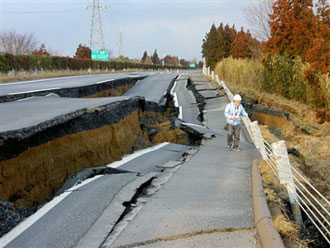“Japanese politics is tainted with egoism and populism,” 3-term Tokyo Governor Shintaro Ishihara told reporters Monday. “We need to use the tsunami to wipe out the egoism that has rusted the Japanese mind for a long time.”
Ishihara has been trying to reform Japan for nearly 40 years, since he first ran for a diet seat and won. He promptly joined 30 other LDP lawmakers in the ultra-rightist Seirankai (“Blue Storm Group”) and sealed a unity pact in blood. As a young man he hung out with ultra-rightist novelist and actor Yukio Mishima who used members of his private army to stage an oddly ritualistic coup attempt in 1970, then committed sepukku.
Among Japanese and other Asians Ishihara became notorious for his xenophobic statements about Koreans and Chinese living in Japan. Among Americans he is remembered for co-authoring The Japan That Can Say No with Sony founder Akio Morita. The book expressed distaste for Japan’s inability to assert itself in its relations with the U.S. and exhorted the nation to become more assertive in world affairs.
Ishihara is a man of deep ignorance whose bigotry and comically impulsive temperament has only been partially ameliorated by his long experience as a career politician forced to engage with disparate elements of Japanese and international society. But in one important respect Ishihara has been dead on: Japan has become the world’s pale, docile fatboy, afraid to speak clearly lest it rekindle memories of its imperial adventures and misadventures.
This is not to denigrate the many admirable qualities embodied in Japanese society, culture and industry. It’s only because of these admirable aspects of Japan that I have any interest in seeing it be more than what it is. On my trips to Japan I am always charmed and impressed by the calm, polite, thoughtful and gentle manners of the people and by the elegant yet fundamentally modest aesthetics of its buildings and furnishings. It is also the easiest place on earth in which to find completely enjoyable restaurant meals at reasonable prices.
Yet I always leave Japan with the sense that it isn’t one of the handful nations I would live in if I couldn’t live in the U.S.
It always comes down to the sense that Japanese have an extremely low tolerance for individuality. Everyone has heard the saw about the difference between Japan and the U.S.: in Japan the nail that sticks out gets hammered down while in the States the squeaky wheel gets the grease.
As a society America may not always reward those who dare to be different but it tacitly recognizes the value of those who stretch the envelope because that makes it easier for everyone to breath. In Japan those who try to test new ways of living or relating to their fellows become resented, belittled and, ultimately, cast out. Why should you have the right to be different when the rest of us have to conform? seems to be the message. Many foreigners, especially non-Asians, don’t feel this attitude acutely because they are automatically exempted as inherently different and apart. And there are always a few Japanese willing to encourage and join them for a romp on the wild side. But those gaijin who have had to live in Japan for extended periods understand the constricting nature of that society — eventually your breathing diminishes to a level barely sufficient to sustain life.
When you don’t dare breath too loudly, it’s hard to inspire anything approaching confidence. Without confidence, there’s no possibility of greatness.
Ishihara’s popularity as a politician comes from the fact that he is essentially telling ultra-conservative Japanese — of which there are far more than most foreigners can guess — that Japan’s return to greatness depends on a rejection of everything foreign and an assertion of traditional Japanese values. With that proposition I completely disagree.
Whatever semblance of greatness Japan achieved as an awakening industrial nation chasing imperial power, then trading power was the product of intense sacrifices made by a working class who had known nothing but self-denial. That population no longer exists though the yearning for greatness persists. Ishihara and his ilk see the quake as an opportunity to direct that yearning backward toward the abyss of a dead era. My hope is that the dire need for strong leadership brought on by last Friday’s catastrophic quake will give breathing room to those bold enough to galvanize Japan with the need to rebuild on a less rigid foundation that can roll on through many future shocks to come.

